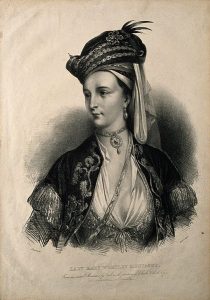31 Biography: Lady Mary Wortley Montagu

Portrait of Lady Mary Wortley Montague
Artist | A. Devaria Source | Wikimedia Commons License | CC BY SA 4.0
(1698-1762)
Mary Wortley Montagu was daughter of Evelyn Pierrepont, Duke of Kingston (1655-1726) and Mary Fielding (cousin of novelist Henry Fielding), who died when Montagu was five. As a female, she was tutored at home but was largely self-educated through reading the books in her father’s library. She read English and French literature and taught herself Latin so that she could read such classical texts as Ovid’s Metamorphoses. In 1712, she married an attorney, Edward Montagu. He was elected to parliament, was sent as a peace negotiator to Constantinople, and was the British ambassador to Turkey (1716-18). Montagu joined her husband in Turkey, from which country she wrote remarkable letters describing her life while in the Middle East. She used her distant vantage point to criticize the limits and restraints—including physical restraints—placed upon women in Europe. At the Turkish bath, the women there entreat Montagu to undress for the bath, an invitation she must refuse because of her Western dress: “I was at last forced to open my skirt and show them my stays, which satisfied them very well, for I saw they believed I was so locked up in that machine that it was not in my own power to open it, which contrivance they attributed to my husband” (The Turkish Embassy Letters: LET XXVI). She used the same technique of contrasts in her Town Eclogues (1747), poems modeled after Virgil’s Eclogues; they use the pastoral form to comment on the city (or court). Through her travel accounts, in various genres, she made an early contribution to the important genre of the woman explorer.
Separated from her husband in 1739, Montague traveled on the Continent until the year of her death, when she returned to London. A selection of her letters was published a year after she died.
Alexander Pope early admired her, exchanged letters and matched poems with her, though he later satirized her, for instance in “To Lady Mary Wortley Montagu,” particularly for her popularizing smallpox inoculation in England. She had observed the practice in Turkey where she had her son inoculated. During a smallpox epidemic in England in 1721, she asked Dr. Charles Maitland to inoculate her daughter against the illness. She then visited several prominent households with her daughter to attest to the safety of the procedure. Conservative thinkers like Pope and anti-inoculationists ridiculed Montagu; though Voltaire, among others, praised her.
Despite being classically opaque, Montagu’s poetry contains some autobiographical elements, for instance, in “Saturday. The Smallpox.” In this poem, she reveals the identity conflict of a woman who has been taught to view herself mainly through her beauty, through her appeal to others (males), but who possesses, values, and attests to internal strengths, such as wit and charm.
This material is from British Literature: Middle Ages to the Eighteenth Century and Neoclassicism by Bonnie J. Robinson from the University System of Georgia, which is licensed under a Creative Commons Attribution-ShareAlike 4.0 International License.
This license allows you to remix, tweak, and build upon this work, even commercially, as long as you credit this original source for the creation and license the new creation under identical terms.
